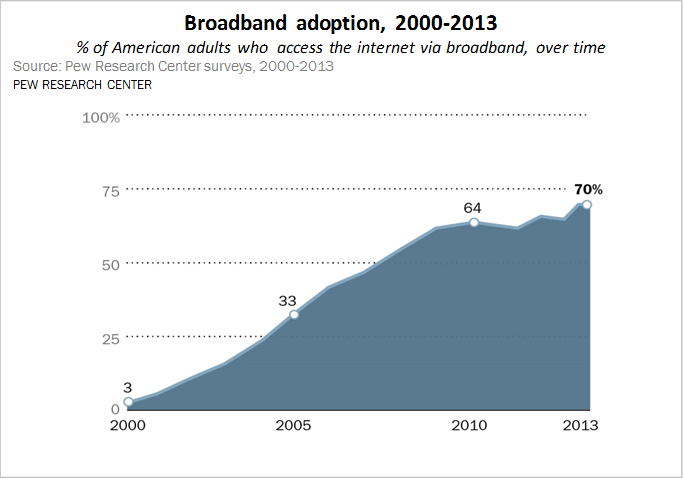Pew Survey: Experts Generally Positive on Future of the Internet

The smarter way to stay on top of broadcasting and cable industry. Sign up below
You are now subscribed
Your newsletter sign-up was successful
One day before the 25th anniversary of the creation of the World Wide Web on March 12, 1989, the Pew Research Center has released a new report based on a survey of nearly 1,500 experts that outlines how many prominent tech commentators see the future of the Internet.
Those experts pointed to a number of promising trends that would make information and entertainment much more widely available. But they also argued that the Internet would continue to disrupt business models for the entertainment industry and some expressed growing concern the Internet's potential for encouraging crime and bullying and the possible loss of privacy.
The study found that many experts agreed on the general outlines of the tech change, which would create "a global, immersive, invisible, ambient networked computing environment," by 2025.
They also expected that the Internet of things would continue to rapidly proliferate as a growing number of sensors in everyday objects feed information into massive data bases and "tagging, databasing and intelligent analytical" technologies would create extensive mapping of the physical and social worlds.
In addition, portable, wearable and even implantable technology would make it possible for people to experience "augmented realities."
In general these developments would speed up the disruptive potential of the Internet, notably impacting older business models in the finance, entertainment, publishing and education sectors.
"A modern adage is that change isn't best measured when a small number of people try a new thing; the biggest disruption comes when adoption is ubiquitous," said Lee Rainie of the Pew Research Center and a co-author of the report.
The smarter way to stay on top of broadcasting and cable industry. Sign up below
The authors of the study also argued that there was much disagreement on the impact of those tech trends on society and people.
"It is striking how much consensus there is among these experts on what will change, and equally striking how varied their answers are when they are asked how those changes will impact and influence users in good and bad ways," noted Elon University professor Janna Anderson, a primary author of the report. "This is the sixth 'Future of the Internet' survey we have conducted since 2004, and for the first time most people are seeing and vividly describing as many potential negatives as they are identifying positives. They worry about interpersonal industry try to adjust."
Pew listed eight generally positive trends. These included the idea that "information sharing over the Internet will be so effortlessly interwoven into daily life that it will become invisible, flowing like electricity, often through machine intermediaries" and that "the spread of the Internet will enhance global connectivity, fostering more positive relationships among societies."
In addition, "the Internet of Things, artificial intelligence and big data will make people more aware of their world and their own behavior" and "augmented reality and wearable devices will be implemented to monitor and give quick feedback on daily life, especially in regard to personal health."
Much of this could be hard on authoritarian governments because these new universal networks would promote "political awareness and action" as well as "peaceful change, and more public uprisings like the Arab Spring."
But a number of experts also worried that "dangerous divides between haves and have-nots may expand, resulting in resentment and possible violence" and that "abuses and abusers will 'evolve and scale,'" as these networks will open new opportunities for "bullying, stalking, stupidity, pornography, dirty tricks, [and] crime."
Governments, corporations and other powerful institutions may also use networks reaching deeper into people's lives than ever before to expand their power and that a number of respondents worried that privacy could be eroded to the point where it is "something only the upscale will enjoy."
The report is part of a series titled "Digital Life in 2025" and is part of a larger research push by the Pew Research Center to mark the 25th anniversary of Sir Tim Berners-Lee's creation of the Web.
It is also the sixth survey of experts done by the Pew Research Center in association with the Imagining the Internet Center at Elon University on the future of the Internet.
A number of very prominent tech figures contributed thoughts, including Vint Cerf (one of the fathers of the Internet), Hal Varian (chief economist at Google), Dave Clark (from MIT and another contributor to the creation of the Internet), and Jonathan Grudin (principal researcher at Microsoft Research), Pew reports.
The expert predictions can be found at the Imagining the Internet Center's Web site.
